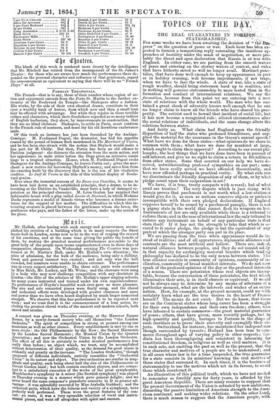PARISLUT THEATRICALS.
The French—that is to say, those of their number whose region of ac- tion and enjoyment extends from the Porte St. Martin to the further ex- tremity of the Boulevard du Temple—like Shakspere after a fashion. His works, by the side of their own classical drama, constitute in their eyes a wealthy bank of horror, from which now and then a small loan may be effected with advantage. But while they rejoice in those terrible crimes and characters, which their forefathers regarded as so many indices of English barbarism, they show, by improvements in construction, that they are no blind idolaters. Shakspere, to settle in Paris, must conform to the French rule of neatness, and must lay his old licentious exuberance aside.
Of this truth an instance has just been furnished by the Ambigu- Comique. M. Ferdinand Dugue, the dramatist, has had his appetite roused by the pound of human flesh mentioned in The Merchant of Venice, and he has been also struck with the notion that Shylock would make a fine part for M. Chilly. But then, Portia has been an old offence to Parisian judgment : she distracts the attention from the main action, and her appearance in male attire before the Doge gives an intrusive comic tinge to a tragical situation. Hence, when M. Ferdinand Dugue cooks Shakspere for the Ambigu-Comique, he leaves Portia out ; gives the mer- chant a new motive for borrowing Shylock's money, and saves him from the exacting knife by the discovery that he is the son of his vindictive creditor. Le fuif de Venise is the title of this brilliant display of Boule- vard genius.
Ever since the immortal success of La Dame our Camaias it seems to have been laid down as an established principle, that a drama, to be in- teresting at the Theatre du Vaudeville, must have a lady of damaged re- putation as the principal character. M. Leon Gozlan has supplied that fashionable house with a play called Louise de Nanteuil, in which Madame Deche represents a model of female virtue who becomes a femme entre- tenue for the support of her mother. The difficulties in which this in- teresting creature is placed between the gentleman whom she loves, the gentleman who pays, and the father of the latter, make up the action of the piece.


































 Previous page
Previous page